Two years ago, Audrie Pott, a Saratoga 15-year-old, committed suicide after photos of her assault at a party were publicized to her classmates. Audrie had legal options to confront what had happened to her, but like most teens she wasn't well versed in them and cultural notions of shame and victim-blaming overpowered her. As the mother of three boys and an attorney practicing technology law, I could see that our teens' lives are a new and intensely provocative mix of technology and social pressure many are ill-equipped to understand.
Crucially, what many don't understand are legal concepts like consent, assault and bullying. High schools can't keep up with the lightning-speed changes in the social media and applications landscape. Without a grasp of what the law says about the boundaries of sexual and social media conduct teen peers will mostly be sharing their ignorance. So I and a group of other attorneys decided to act. We've been going into schools and teaching kids those key legal concepts.
The questions students ask make it clear that questionable cultural notions they may have acquired about fault do not line up with legal concepts. The law punishes bad acts and what the victim was wearing or whether he or she was drunk, for example, are no defense. It is also clear that teens make assumptions that inhibit their willingness to speak up about cyberbullying and sexual misconduct. For example, many victims of sexual assault worry that they will be charged for underage drinking if they go to the police. It's not just the fault of teens that the relevant laws are poorly understood - they're complex and often my answer to a question starts with "it depends...'
Teens are empowered to make good choices when they are educated about their rights and obligations in these areas, such as the legal protection of a person's dignity, the right to be free from unwanted physical contact, and that the law does not blame the victim.
If we're able to prevent even one more case like Audrie Pott's, we will have succeeded.
